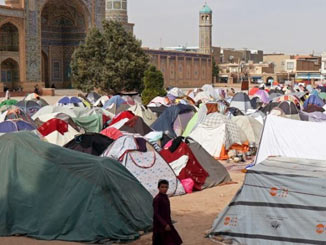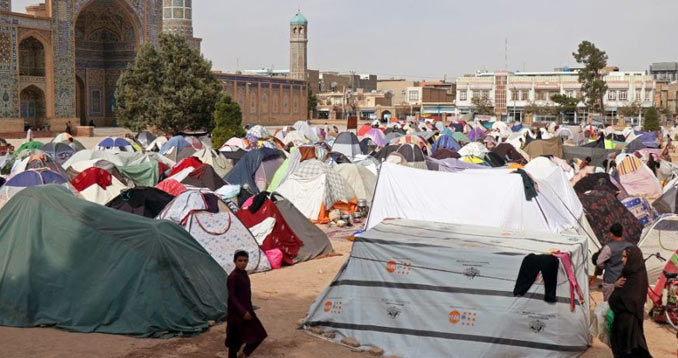

After a catastrophic 6.3 magnitude earthquake struck, plunging Herat into a humanitarian crisis, its residents continue to grapple with the aftermath, sleeping on the streets and in the open desert at night. The earthquake’s relentless aftershocks have amplified anxiety and restlessness among the populace. Additionally, the mishandling of aid distribution and the Taliban’s involvement in it are now major sources of concern.
One week following the previous deadly earthquake in Herat, residents had chosen to go back to their homes. However, another 6.3 magnitude earthquake rattled the province, intensifying the anxiety and the severity of the Herat disaster.
The second major earthquake in Herat has caused two fatalities and 178 injuries. According to the Hasht-e Subh Daily’s reports, only a few buildings in Herat city have escaped damage. This earthquake has left around a hundred villages in Gulran, Kushk Rabat, Sangi, Injil, Guzara, and Obe districts in ruins.
The relentless and powerful earthquakes in Herat have compelled the province’s residents to endure their eleventh consecutive night in the cold open air. Amidst their anxiety and fear, a tragic incident occurred on Tuesday night when a woman lost her life due to illness and the frigid conditions in Herat city.
The earthquake’s severity and its devastating impact have deterred people from going back to their homes. Many individuals state that they “lack the heart to return home and have no place to stay outdoors.” Despite concerns about the cold weather and the absence of amenities, people persist in selecting the streets as their shelter.
Mohammad Naeem, a resident of the sixth district of Herat city, reveals that he spent the tenth night outside of his home with his children. This Herat resident, with his eight-member family, has a six-person “makeshift tent” and, due to the fear of earthquakes, spends his nights outside the house.
He further remarks, “From the day of the earthquake until now, my wife briefly steps out during the day to cook, then returns to the tent. We must spend the nights outside. We have a makeshift tent, and we sleep outdoors at night. I worry about the cold weather and ensuring my children’s safety from it.”
Nonetheless, ongoing concerns about the earthquake and the increasing cold have led to a rise in seasonal illnesses among children. Najiba is one of the residents of Herat who, along with her bride and grandson, has spent the night in the open air for the past ten days. She explains that her grandson has fallen ill due to the cold weather, and they don’t have the means to buy a tent for themselves.
Herat’s residents currently voice concerns about harsh living conditions and the scarcity of tents and amenities, even though millions of dollars in humanitarian aid from various countries have arrived in Herat over the past two weeks.
Certain residents of this province allege that aid is not reaching those who require it, and the Taliban are allocating it to their own families and acquaintances. An anonymous Herat resident asserts, “The Taliban control the aid. Needy individuals are struggling, while the Taliban families are reaping all the aid’s benefits.”
A local source has confirmed that the Taliban is actively involved in the distribution of earthquake aid to victims in Herat. They report, “Regrettably, the Taliban is exerting influence over aid distribution in numerous Herat villages. They allocate aid to their own associates and family members, even those who haven’t suffered any impact. They’ve deployed their intelligence agents to the villages, intimidating the locals, and collaborating with village leaders to misappropriate the aid.”
After 12 days since the occurrence of the earthquake in Herat, precise and uniform statistics on the affected individuals have not yet been provided. However, according to the United Nations Office for the Coordination of Humanitarian Affairs (OCHA), 300,000 houses have been destroyed, and more than 43,000 people have been affected. This organization has called for $93.6 million in global assistance for the earthquake victims in Herat.
OCHA also added that this amount will be used over six months, from October 2023 to March 2024. The agency has stated that the intense earthquakes in western Afghanistan have put 114,000 people in need of humanitarian assistance.
It should be noted that the residents of Herat are currently complaining about the lack of tents to spend cold nights, while Dr. Tedros Adhanom Ghebreyesus, the Director-General of the World Health Organization (WHO), has stated that Herat has turned into a “city of small tents.” He added, “The World Health Organization team, along with its partners, is supporting the establishment of health tents so that people can receive healthcare services.”
After 12 days since the earthquake in Herat, people are still concerned about aftershocks and the lack of access to medical and food aid. However, the Taliban have reported their presence in the earthquake-affected areas and emphasized that they are managing the situation.

Leave a Reply